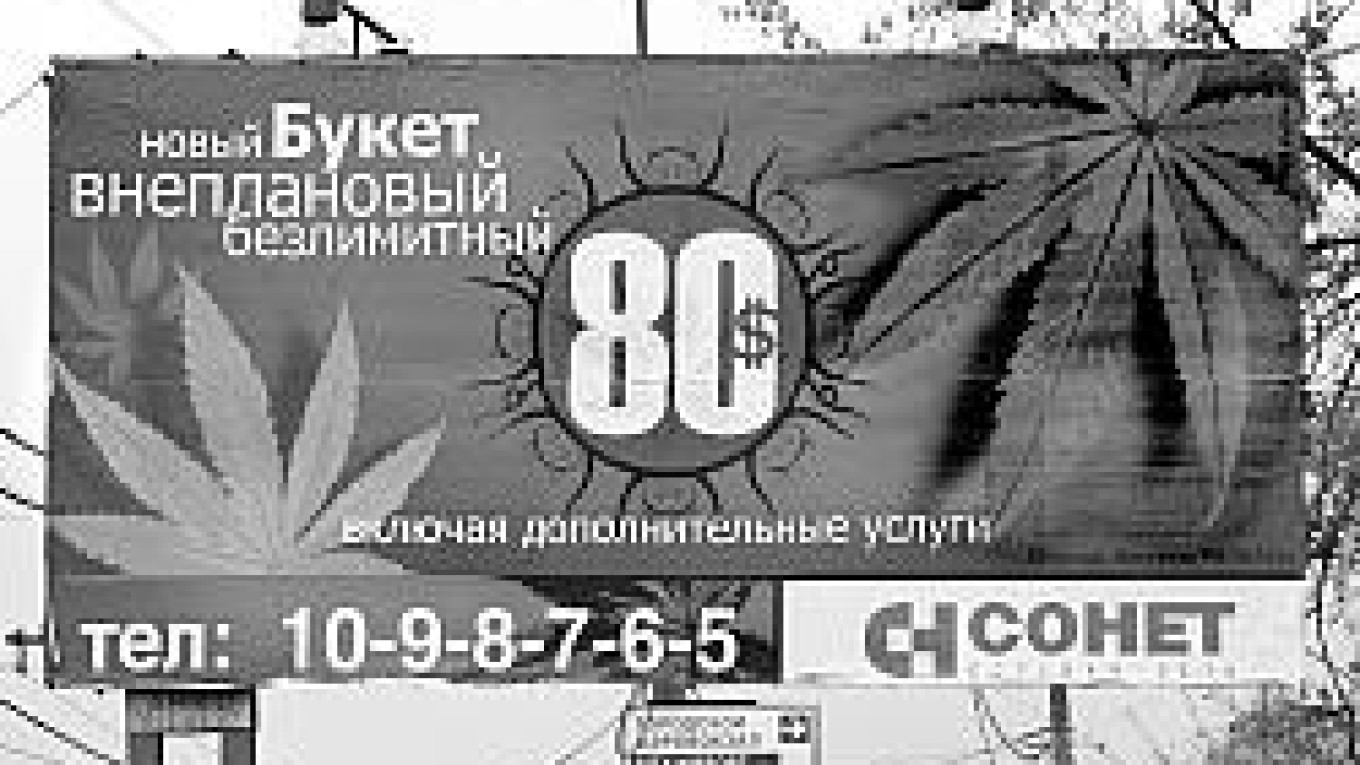With the narcotics police launching a nationwide campaign against merchandise depicting marijuana leaves, you might just get in trouble with the law.
Last week, agents from the Federal Drug Control Service charged a shopkeeper in Arkhangelsk for distributing "drug propaganda."
His offense? Selling removable cellphone covers that feature an image of a cannabis leaf.
The vendor, an employee of cellphone store chain Yevroset, faces a 4,000 ruble ($140) fine if found guilty.
Although that sum may seem small, drug law reform groups are warning that a series of ideologically charged "special operations" do little to curb the drug problem and infringe on free speech rights.
A dozen cases have been opened in the Arkhangelsk region and many more have already been successfully prosecuted in courts in other parts of Russia, said Nikolai Sumburov, a federal narcotics agent who organized the Arkhangelsk investigation.
Yevroset has faced ten similar cases nationwide over the past six months, said company vice president Boris Levin.
Narcotics agents are pressing charges based on a provision in the Advertising Law that makes it illegal to advertise drugs, as well as on an article in the Administrative Code on the "promotion of narcotic and psychotropic substances and their precursors."
After making a "control purchase" of the cellphone covers, Sumburov sent them to the Federal Anti-Monopoly Service, which regulates the advertising market.
Last week the anti-monopoly service announced it had concluded that the goods on sale in Arkhangelsk violated the law -- evidence the authorities can use against the Yevroset store owner.
A court date has not yet been set, Sumburov said.
Yevroset said it did not agree with the charges but would discontinue sale of the controversial phone covers to avoid problems with the authorities, Levin said.
"Personally I don't consider this to be [drug] propaganda. The narcotics agency needs to be catching drug dealers -- not this nonsense."
But Sumburov argued that fighting the sale of drug paraphernalia is as important as snaring dealers.
"Sixteen- and 17-year-old teenagers buy the cellphone so they can consider themselves to be part of the so-called subculture," Sumburov said. "Then they start thinking about trying the drug."
Lev Levinson, head of New Drug Policy, an advocacy group for drug law reform, is a harsh critic of the Federal Drug Control Service.
The belief that mere pictures of marijuana can entice youths to use drugs is too simplistic, Levinson said.
"[The cannabis leaf] is a cultural phenomenon. It can't be viewed with such simple arithmetic," Levinson said.
"If you follow that logic, why not create a 'moral police' squad?"
Levinson said the Federal Drug Control Service, which was created out of the former Tax Police last year, is accustomed to combating white-collar crime and is reluctant to go after serious drug offenders.
"The regular police still have all the expertise," he said.
The Arkhangelsk investigation comes after an online bookstore, www.books.ru, was fined 40,000 rubles for selling a book about marijuana in May. Its entire stock of "Marijuana, The Forbidden Medicine" by Lester Grinspoon and James Bakalar was confiscated by court order.
The Federal Drug Control Service has also pressed charges against vendors of T-shirts and jewelry with images of marijuana.
Sellers of Cannabis Vodka, which contains hemp seeds and features a picture of a marijuana leaf on the label, have been taken to court in Kaliningrad and Voronezh.
The vodka contains no tetrahydrocannabinol, the chemical that gives marijuana its intoxicating effect, and the vendor in Voronezh was acquitted. But a Kaliningrad court found the seller of the vodka guilty.
Some of the products police have confiscated carry messages calling for the decriminalization of marijuana use, Levinson said.
"The word 'legalize' is a political demand. Censoring it and punishing people for it is a direct violation of the Constitution," he said.
But the Federal Drug Control Service does not look like it will be easing the pressure anytime soon.
"We do not operate according to the Constitution," said Valentin Zhdanov, the head of the Federal Drug Control Service's office in Arkhangelsk .
"We are regulated by other laws and the president. Constitutionality is decided by the courts."
A Message from The Moscow Times:
Dear readers,
We are facing unprecedented challenges. Russia's Prosecutor General's Office has designated The Moscow Times as an "undesirable" organization, criminalizing our work and putting our staff at risk of prosecution. This follows our earlier unjust labeling as a "foreign agent."
These actions are direct attempts to silence independent journalism in Russia. The authorities claim our work "discredits the decisions of the Russian leadership." We see things differently: we strive to provide accurate, unbiased reporting on Russia.
We, the journalists of The Moscow Times, refuse to be silenced. But to continue our work, we need your help.
Your support, no matter how small, makes a world of difference. If you can, please support us monthly starting from just $2. It's quick to set up, and every contribution makes a significant impact.
By supporting The Moscow Times, you're defending open, independent journalism in the face of repression. Thank you for standing with us.
Remind me later.


